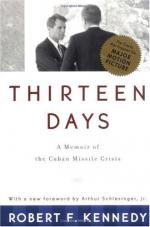
|
| Name: _________________________ | Period: ___________________ |
This test consists of 5 multiple choice questions, 5 short answer questions, and 10 short essay questions.
Multiple Choice Questions
1. What book had JFK recently read that had to do with miscalculations leading to war?
(a) The Rise and Fall of the Third Reich.
(b) Night.
(c) The Dangerous Summer.
(d) The Guns of August.
2. Why did JFK change the line of interception for the blockade?
(a) To show force.
(b) For safety.
(c) To buy time.
(d) To tighten the line.
3. Who does JFK meet with whom Robert claims he "trusted implicitly" (51)?
(a) Ambassador David Ormsby-Gore.
(b) Secretary John McNamara.
(c) Secretary Adlai Stevenson.
(d) Ambassador Dobrynin.
4. Who said that Russia only wanted to "give bread to Cuba in order to prevent hunger in that country" (34)?
(a) Castro.
(b) Dobrynin.
(c) Gromyko.
(d) Khrushchev.
5. Who does Robert speak to about the President's concern about missiles in Cuba on September 4th?
(a) Ambassador Dobrynin.
(b) The Deputy Attorney General.
(c) Soviet Chairman Nikita Khrushchev.
(d) The President.
Short Answer Questions
1. How many Americans could potentially have died within minutes of the known missiles being fired off as of October 18th?
2. While Ex Comm was making final decisions regarding their recommendations, JFK was where?
3. In the section "Tuesday morning, October 16, 1962 . . .," why were initial reports of missiles in Cuba not passed on to the President?
4. Against what strategy was the following argument used: It would be like "closing the door after the horse has left the barn" (28)?
5. What did Adlai Stevenson suggest that offended many members of Ex Comm?
Short Essay Questions
1. What was one argument against a blockade?
2. What was one argument for a blockade?
3. What information did the Intelligence Community have about the missiles in September, but did not inform the President about at that time? Why were they not passed on?
4. After the blockade takes effect, RFK meets with Dobrynin again. What do they discuss?
5. Why does RFK slip the President a note saying "I now know how Tojo felt when he was planning Pearl Harbor" (25)? How do the situations compare?
6. What did Ambassador Dobrynin provide as evidence that USSR would not be a threat to the United States?
7. What other actions did the U.S. take besides the blockade?
8. How does Berlin factor into the decision making about the Cuban Missile Crisis?
9. Why does JFK bring up the book The Guns of August by Barbara Tuchman?
10. What distinguishes Thirteen Days as a memoir (besides the subtitle) and not just an autobiography?
|
This section contains 1,347 words (approx. 5 pages at 300 words per page) |

|




